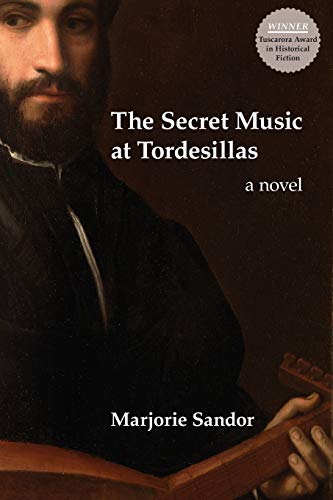The Secret Music at Tordesillas
It’s the snow, says musician Juan de Granada, that prevented him from leaving the grounds of Tordesillas, attending Mass, and mourning the death of Queen Juana I of Castile in 1555—not a nefarious reason, like secreting away items of royal treasure or harboring a heretic Jew. He is open, therefore, to telling commissioners all he knows about his time with the “mad queen” and the elusive Inés de Castro. Thus begins Juan’s recollections of his separation from his Jewish family, his mastery of Spanish music, his selection as a musician in the royal court, and his interactions with the queen before and after she is forced into seclusion at Tordesillas.
The Secret Music at Tordesillas is the first novel by Marjorie Sandor and winner of the inaugural Tuscarora Award, which is given by Hidden River Press for an unpublished work of historical fiction. Sandor won the National Jewish Book Award in 2004 for two essay collections and is a member of the Oregon State University MFA faculty.
The novel chronicles the major events in Queen Juana’s life as well as the actions that forbade the practice and traditions of Judaism and dispelled “heretical” Jews and Moors from Spain through Juan’s eyes. Though some aspects of the plot are confusing, these drawbacks are overcome by the beauty of the language. This is a moving lamentation not only for the loss of culture but the replacement of the stringed Arabic oud with the Spanish vihuela as Catholic King Ferdinand and Queen Isabella worked to remove any reminders of other religions and cultures. The lyricism makes the reader long to hear the oud and the songs instrumentalists like Juan de Granada could play.










